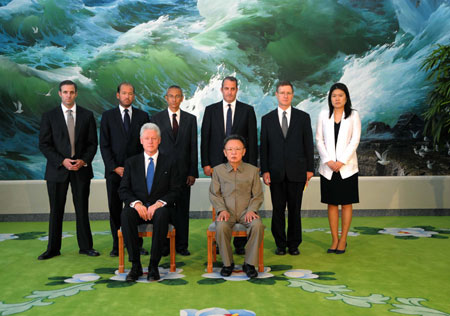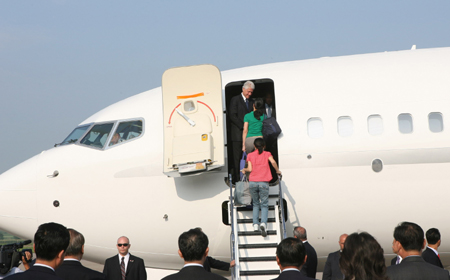|

Photo released by DPRK's official news agency KCNA shows former US president Bill Clinton (L, seated) and DPRK's top leader Kim Jong-il (R, seated) posing for a picture in Pyongyang on August 4, 2009. [Xinhua]
|
PYONGYANG: The Democratic People's Republic of Korea (DPRK) in recent weeks has made a series of conciliatory moves toward the United States and South Korea.
That's after months of tensions on the divided Korean peninsula aroused by the DPRK's nuclear and missile tests.
The easing of tension began when former US President Bill Clinton paid a surprise visit to Pyongyang in early August to win the release of two detained American journalists.
After that trip, DPRK diplomats at the United Nations requested a meeting with New Mexico Governor Bill Richardson, who has visited Pyongyang several times in the past.
The DPRK is sending good signals that it's ready to talk directly to the United States, Richardson said on the CNN.
"They felt that the President Clinton visit was good, that it helped thaw relations, make them easier," he said.
|
 The two female American journalists amnestied by the DPRK go aboard a chartered plane carrying the homebound former US president Bill Clinton to leave Pyongyang, capital of the DPRK, on August 5, 2009. [Xinhua]
The two female American journalists amnestied by the DPRK go aboard a chartered plane carrying the homebound former US president Bill Clinton to leave Pyongyang, capital of the DPRK, on August 5, 2009. [Xinhua] |
A visit to Pyongyang by Hyun Jung-eun, the chairwoman of the South Korean Hyundai Group, on Aug. 10 helped free a South Korean worker detained by the DPRK for nearly five months.
The DPRK has also agreed to lift restrictions on borders with South Korea and to resume border tourism and the reunion of families separated by the Korean War, ending a year long cut-off of inter-Korean relations.
The thaw continued when DPRK top leader Kim Jong-il sent a high-level condolence delegation to Seoul to mourn former South Korean President Kim Dae Jun, who died August 18.

